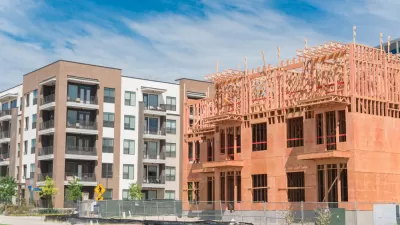Local governments in the Volunteer State can now offer developers incentives like increased density, lower parking requirements, and priority permitting for affordable housing projects.

Tennessee Gov. Bill Lee has signed into law a bill aimed at stimulating construction of affordable housing. According to an Nooga Today article by Kristen Templeton, local governments in the state are now able to offer no-cost incentives to builders of affordable housing developments:
- Increased density allowance to allow more units to be built on a piece of land, which makes it possible to build lower-cost homes.
- Lowered parking requirements, which can create savings up to $14,000 per home.
- Priority permitting, which can reduce carrying costs for developers in the pre-development process.
The incentive programs are voluntary and must align with PILOT reform and upcoming zoning reform. “Each municipality wishing to adopt the new framework will have to pass a local ordinance detailing the local incentives + [sic] process. Once adopted, developers and builders can opt in through a written notice of interest, and projects that meet the criteria will go through a review process for approval or denial by the Regional Planning Commission,” reports Templeton.
These types of no-cost incentives can be an easier pill for community stakeholders to swallow versus tax incentives and fees waivers, as they don’t directly cost local or state government revenue. But, according to InclusionaryHousing.org, “Even planning incentives such as density bonuses, which appear free, result in increased infrastructure and other public costs.” They add, “communities have to carefully weigh the costs and benefits of each incentive and evaluate them relative to the cost of meeting specific affordable housing requirements.”
FULL STORY: Bill signed to allow incentives for housing affordability in Tennessee

Planetizen Federal Action Tracker
A weekly monitor of how Trump’s orders and actions are impacting planners and planning in America.

Maui's Vacation Rental Debate Turns Ugly
Verbal attacks, misinformation campaigns and fistfights plague a high-stakes debate to convert thousands of vacation rentals into long-term housing.

Restaurant Patios Were a Pandemic Win — Why Were They so Hard to Keep?
Social distancing requirements and changes in travel patterns prompted cities to pilot new uses for street and sidewalk space. Then it got complicated.

In California Battle of Housing vs. Environment, Housing Just Won
A new state law significantly limits the power of CEQA, an environmental review law that served as a powerful tool for blocking new development.

Boulder Eliminates Parking Minimums Citywide
Officials estimate the cost of building a single underground parking space at up to $100,000.

Orange County, Florida Adopts Largest US “Sprawl Repair” Code
The ‘Orange Code’ seeks to rectify decades of sprawl-inducing, car-oriented development.
Urban Design for Planners 1: Software Tools
This six-course series explores essential urban design concepts using open source software and equips planners with the tools they need to participate fully in the urban design process.
Planning for Universal Design
Learn the tools for implementing Universal Design in planning regulations.
Heyer Gruel & Associates PA
JM Goldson LLC
Custer County Colorado
City of Camden Redevelopment Agency
City of Astoria
Transportation Research & Education Center (TREC) at Portland State University
Jefferson Parish Government
Camden Redevelopment Agency
City of Claremont





























